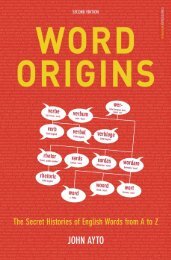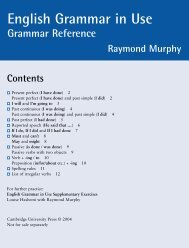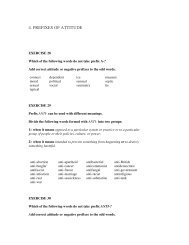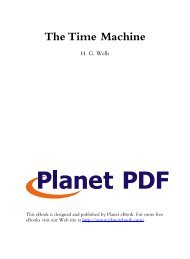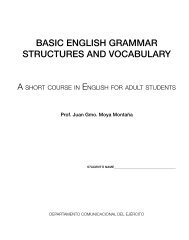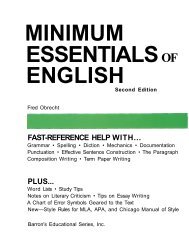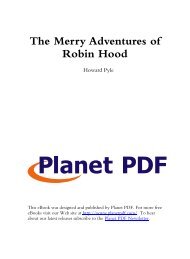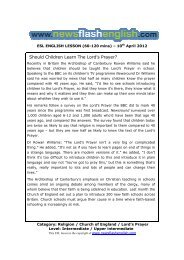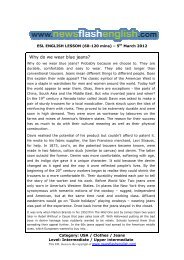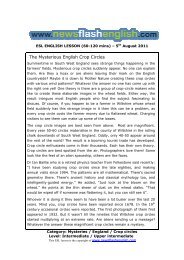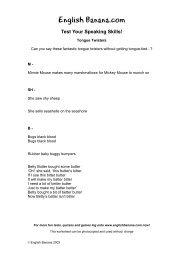A Grammar of the English Tongue - ESL Teachers Board
A Grammar of the English Tongue - ESL Teachers Board
A Grammar of the English Tongue - ESL Teachers Board
Create successful ePaper yourself
Turn your PDF publications into a flip-book with our unique Google optimized e-Paper software.
A <strong>Grammar</strong> <strong>of</strong> <strong>the</strong> <strong>English</strong> <strong>Tongue</strong> 19For pronunciation <strong>the</strong> best general rule is, to consider those as <strong>the</strong> mostelegant speakers who deviate least from <strong>the</strong> written words.There have been many schemes <strong>of</strong>fered for <strong>the</strong> emendation and settlement<strong>of</strong> our orthography, which, like that <strong>of</strong> o<strong>the</strong>r nations, being formed bychance, or according to <strong>the</strong> fancy <strong>of</strong> <strong>the</strong> earliest writers in rude ages, was atfirst very various and uncertain, and is yet sufficiently irregular. Of <strong>the</strong>sereformers some have endeavoured to accommodate orthography better to<strong>the</strong> pronunciation, without considering that this is to measure by a shadow,to take that for a model or standard which is changing while <strong>the</strong>y apply it.O<strong>the</strong>rs, less absurdly indeed, but with equal unlikelihood <strong>of</strong> success, haveendeavoured to proportion <strong>the</strong> number <strong>of</strong> letters to that <strong>of</strong> sounds, thatevery sound may have its own character, and every character a singlesound. Such would be <strong>the</strong> orthography <strong>of</strong> a new language, to be formed bya synod <strong>of</strong> grammarians upon principles <strong>of</strong> science. But who can hope toprevail on nations to change <strong>the</strong>ir practice, and make all <strong>the</strong>ir old booksuseless? or what advantage would a new orthography procure equivalent to<strong>the</strong> confusion and perplexity <strong>of</strong> such an alteration?Some ingenious men, indeed, have endeavoured to deserve well <strong>of</strong> <strong>the</strong>ircountry, by writing honor and labor for honour and labour, red for read in<strong>the</strong> preter-tense, sais for says, repete tor repeat, explane for explain, ordeclame for declaim. Of <strong>the</strong>se it may be said, that as <strong>the</strong>y have done nogood <strong>the</strong>y have done little harm; both because <strong>the</strong>y have innovated little,and because few have followed <strong>the</strong>m.The <strong>English</strong> language has properly no dialects; <strong>the</strong> style <strong>of</strong> writers has nopr<strong>of</strong>essed diversity in <strong>the</strong> use <strong>of</strong> words, or <strong>of</strong> <strong>the</strong>ir flexions andterminations, nor differs but by different degrees <strong>of</strong> skill or care. The oraldiction is uniform in no spacious country, but has less variation in Englandthan in most o<strong>the</strong>r nations <strong>of</strong> equal extent. The language <strong>of</strong> <strong>the</strong> nor<strong>the</strong>rncounties retains many words now out <strong>of</strong> use, but which are commonly <strong>of</strong><strong>the</strong> genuine Teutonick race, and is uttered with a pronunciation which nowseems harsh and rough, but was probably used by our ancestors. Thenor<strong>the</strong>rn speech is <strong>the</strong>refore not barbarous, but obsolete. The speech in <strong>the</strong>western provinces seems to differ from <strong>the</strong> general diction ra<strong>the</strong>r by a



